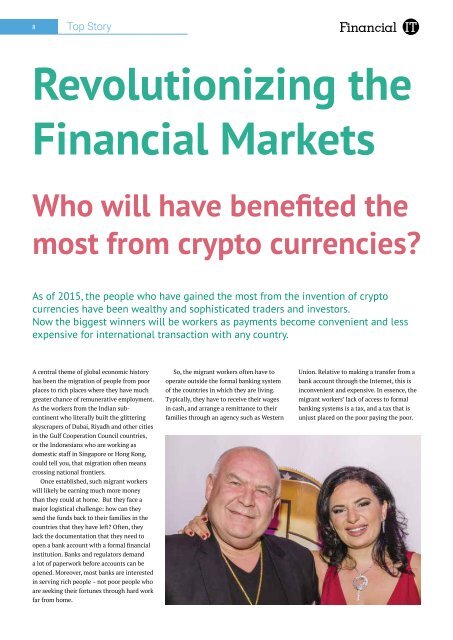Revolutionizing the Financial Markets
Cím: Forradalmasítja a pénzügyi piacok Leírást/ellenőrzések: Több mint 100 000 előfizetőt, amelyek 70 %-a bankok, a pénzügyi az összpontosított közzététele a vezető pénzügyi technológiai hírek a világ, beleértve a technológia blockchain és a cryptocurrencies.
Cím: Forradalmasítja a pénzügyi piacok
Leírást/ellenőrzések: Több mint 100 000 előfizetőt, amelyek 70 %-a bankok, a pénzügyi az összpontosított közzététele a vezető pénzügyi technológiai hírek a világ, beleértve a technológia blockchain és a cryptocurrencies.
- No tags were found...
You also want an ePaper? Increase the reach of your titles
YUMPU automatically turns print PDFs into web optimized ePapers that Google loves.
8<br />
Top Story<br />
<strong>Revolutionizing</strong> <strong>the</strong><br />
<strong>Financial</strong> <strong>Markets</strong><br />
Who will have benefited <strong>the</strong><br />
most from crypto currencies?<br />
As of 2015, <strong>the</strong> people who have gained <strong>the</strong> most from <strong>the</strong> invention of crypto<br />
currencies have been wealthy and sophisticated traders and investors.<br />
Now <strong>the</strong> biggest winners will be workers as payments become convenient and less<br />
expensive for international transaction with any country.<br />
A central <strong>the</strong>me of global economic history<br />
has been <strong>the</strong> migration of people from poor<br />
places to rich places where <strong>the</strong>y have much<br />
greater chance of remunerative employment.<br />
As <strong>the</strong> workers from <strong>the</strong> Indian subcontinent<br />
who literally built <strong>the</strong> glittering<br />
skyscrapers of Dubai, Riyadh and o<strong>the</strong>r cities<br />
in <strong>the</strong> Gulf Cooperation Council countries,<br />
or <strong>the</strong> Indonesians who are working as<br />
domestic staff in Singapore or Hong Kong,<br />
could tell you, that migration often means<br />
crossing national frontiers.<br />
Once established, such migrant workers<br />
will likely be earning much more money<br />
than <strong>the</strong>y could at home. But <strong>the</strong>y face a<br />
major logistical challenge: how can <strong>the</strong>y<br />
send <strong>the</strong> funds back to <strong>the</strong>ir families in <strong>the</strong><br />
countries that <strong>the</strong>y have left? Often, <strong>the</strong>y<br />
lack <strong>the</strong> documentation that <strong>the</strong>y need to<br />
open a bank account with a formal financial<br />
institution. Banks and regulators demand<br />
a lot of paperwork before accounts can be<br />
opened. Moreover, most banks are interested<br />
in serving rich people – not poor people who<br />
are seeking <strong>the</strong>ir fortunes through hard work<br />
far from home.<br />
So, <strong>the</strong> migrant workers often have to<br />
operate outside <strong>the</strong> formal banking system<br />
of <strong>the</strong> countries in which <strong>the</strong>y are living.<br />
Typically, <strong>the</strong>y have to receive <strong>the</strong>ir wages<br />
in cash, and arrange a remittance to <strong>the</strong>ir<br />
families through an agency such as Western<br />
Union. Relative to making a transfer from a<br />
bank account through <strong>the</strong> Internet, this is<br />
inconvenient and expensive. In essence, <strong>the</strong><br />
migrant workers’ lack of access to formal<br />
banking systems is a tax, and a tax that is<br />
unjust placed on <strong>the</strong> poor paying <strong>the</strong> poor.



